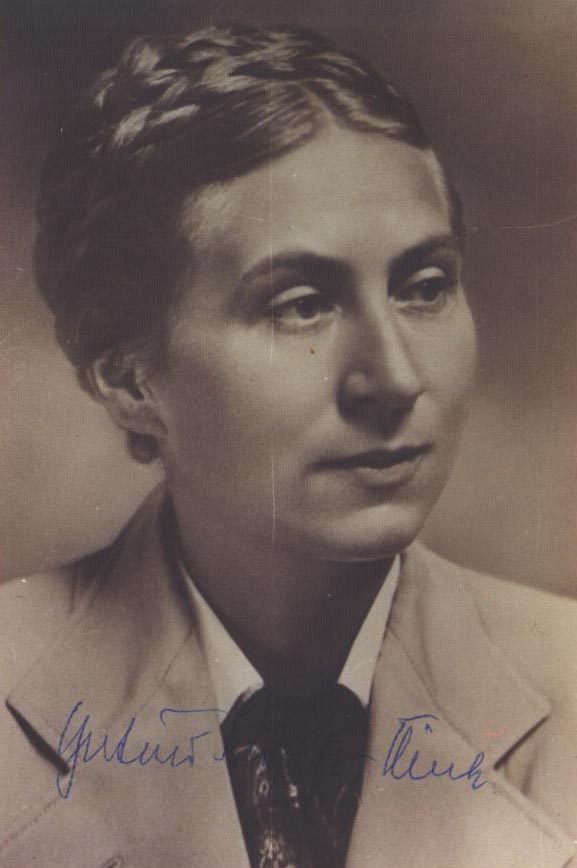
|
~SOLD~ SCHOLTZ-KLINK Gertrud
SCHOLTZ-KLINK Gertrud
Born Gertrud Scholz-Treusch
(1902-02-09)9 February 1902
Adelsheim, Baden
Died 24 March 1999(1999-03-24) (aged 97)
Tübingen-Bebenhausen
Gertrud Scholtz-Klink née Treusch (9 February 1902 – 24 March 1999) was a fervent Nazi Party (NSDAP) member and leader of the National Socialist Women's League (NS-Frauenschaft) in Nazi Germany
Scholtz-Klink joined the Nazi Party and by 1929 became leader of the women's section in Berlin. In 1932, Scholtz-Klink married Guenther Scholtz, a country doctor (divorced in 1938).
When Adolf Hitler came to power in 1933, he appointed Scholtz-Klink as Reich's Women's Führerin and head of the Nazi Women's League. A good orator, her main task was to promote male superiority and the importance of child-bearing. In one speech, she pointed out that "the mission of woman is to minister in the home and in her profession to the needs of life from the first to last moment of man's existence."
Despite her own position, Scholtz-Klink spoke against the participation of women in politics, and took the female politicians in Germany of the Weimar Republic as a bad example, saying, "Anyone who has seen the Communist and Social Democratic women scream on the street and the parliament, realize that such an activity is not something which is done by a true woman". She claimed that for a woman to be involved in politics, she would either have to "become like a man", which would "shame her sex", or "behave like a woman", which would prevent her from achieving anything.
In July 1936, Scholtz-Klink was appointed as head of the Woman's Bureau in the German Labor Front, with the responsibility of persuading women to work for the benefit of the Nazi government. In 1938, she argued that "the German woman must work and work, physically and mentally she must renounce luxury and pleasure", though she herself enjoyed a comfortable material existence.
Scholtz-Klink was usually left out of the more important meetings in the male-dominated society of the Third Reich, and was considered to be a figurehead. She did, however, have the influence over women in the party as Hitler had over everyone else.
By 1940, Scholtz-Klink was married to her third husband SS-Obergruppenführer August Heissmeyer, and made frequent trips to visit women at Political Concentration Camps.
Post-war life
After the fall of the Third Reich, in the summer of 1945, she was briefly detained in a Soviet prisoner of war camp, but escaped shortly after and went into hiding in Bebenhausen Castle near Tübingen. She and her third husband spent the subsequent three years under the aliases of Heinrich and Maria Stuckebrock.
On 28 February 1948, the couple were identified and arrested. A French military court sentenced Scholtz-Klink to 18 months in prison on the charge of forging documents. In May 1950, a review of her sentence classified her as the "main culprit" and sentenced her to additional 30 months. In addition, the court imposed a fine and banned her from political and trade union activity, journalism and teaching for ten years.
After her release from prison in 1953, Sholtz-Klink settled back in Bebenhausen.
In her 1978 book Die Frau im Dritten Reich ("The Woman in the Third Reich"), Scholtz-Klink demonstrated her continuing support for the National Socialist ideology. She once again upheld her position on National Socialism in her interview with historian Claudia Koonz in the early 1980s.
She died on 24 March 1999 in Bebenhausen, Germany.
From Wikipedia, the free encyclopedia
Signed 4" x 6" Postwar photo
Price: $0.00
Please contact us before ordering to confirm availability and shipping costs.
Buy now with your credit card
other ways to buy
|


